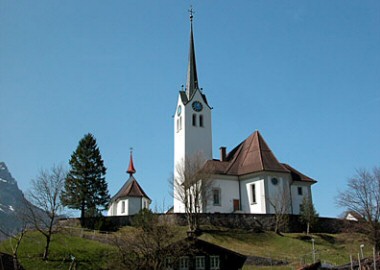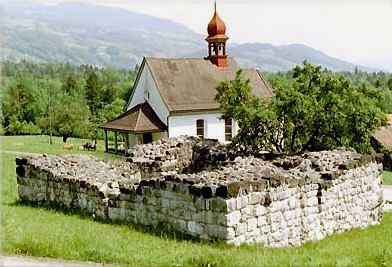The three castles of Giswil
The village is mentioned for the first time in a document from 840. Giswil was a dairy farm of the "Hof" monastery in Lucerne, which was founded by the Murbach monastery in Alsace. For the valley of Obwalden, it was also the seat of the monastic administrative officials.
German-speaking Switzerland together with Alsace belonged to the Duchy of Swabia until the end of the 12th century.
In the 13th century, the barons of Wolhusen succeeded in uniting Meieramt and Vogtei and largely removed them from the abbot's control. Murbach therefore sold all his territories in what is now Switzerland to the Habsburgs in 1291.
Numerous medieval wooden buildings can be admired on the valley floor of Giswil. Probably the oldest house (Schrotenmatt) was built in 1467.
Because of its favourable strategic location, Giswil once owned three castles: 13. Jahrhundert gelang es den Freiherren von Wolhusen, Meieramt und Vogtei zu vereinigen und sie der Kontrolle des Abtes weitgehend zu entziehen. Murbach verkaufte daher 1291 alle seine Territorien in der heutigen Schweiz an die Habsburger.
Im Talboden von Giswil sind zahlreiche mittelalterliche Holzbauten zu bewundern. Das vermutlich älteste Haus (Schrotenmatt) wurde 1467 erbaut.
Wegen seiner günstigen strategischen Lage besass Giswil einst drei Burgen:

The parish church of St. Laurentius stands on the former castle hill of Hunwil. The castle ruins provided much of the material for the new parish church, which was consecrated in 1635. Immediately adjacent is the ossuary chapel of St. Michael, which was built between 1657 and 1661 and renovated in 2001.

Between the Brünig railway and Brünig street you can still find the ruins of Rudenz Castle, the former seat of the Rudenz.

The remains of a third castle can be found in the small section between the chapel and the Hotel Alpenrösli. They come from a Meier tower of the Benedictine abbey of Lucerne-Murbach. It has been called Rosenberg since the 17th century and is the oldest castle in Giswil.